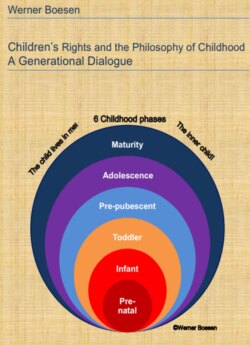Читать книгу Children's Rights and the Philosophy of Childhood: A Generational Dialogue - Werner Boesen - Страница 3
На сайте Литреса книга снята с продажи.
Preface and Acknowledgements
ОглавлениеThe present study was developed as part of a project at a German university and deals with the following the framework topic: Generations – Between Consistency and Change. My focusses centered on the first and second generation of being human , children and adults, and adults as parents. In my attempts to develop a basic scientific discipline, I discovered that there were many disciplines available here. The foundation of my analysis became the philosophy and integration of basic human knowledge of other disciplines of science, such as psychology, sociology, education, and law. In philosophy, I stumbled across a variety of sub-disciplines and I finally chose the childhood philosophy, a young research direction primarily in the American cultural space. In the German-speaking world, the term “child ethics” is commonly used, which refers to the moral behavior of mankind, and is therefore restricted to the general concept of philosophy which was limiting. Even the term “philosophy” in one of its possible definitions refers to the “love of wisdom” and gave me the direction for the following questions: What is love, what is wisdom? and what connects it to childhood in human existence? The framework topic in the project pointed me to a solid relationship, verbal and non-verbal, of generations, and their agility “between permanence and change,” for which dialogue is imperative. The anchor for this was offered to me by the philosophy of dialogue, a predominantly religious-philosophical subdiscipline that differentiates two people, as well as nature and the cosmos. This involves a twofold relationship, that of the ego (the “I”) and the thou (the “You”). It was also of general interest to consider the current legislation on children’s rights. The basic work and concerns here are the United Nations Convention on the Rights of the Child and their application within national constitutions, which only a few countries have implemented to date. It should be noted that the Convention on the Rights of the Child, not only in the philosophical sense, does not meet all the requirements of the child. This will be dealt with more comprehensively in the upcoming study, including a religion-specific view on the example of Christianity.
This project study was restricted to a certain number of pages. The specification was based on about 40 DIN A4 pages. It was extremely challenging for me to limit the content to this page specification and it is not enough that questions arise. I have therefore attached a questionnaire with possible answers for publication. It was also important to me to publish this work as both a German-language and English-language publication, as the childhood philosophy is underrepresented research publications in the German-speaking world.
In particular, I would like to thank the lecturers of the project study for their contributions to the discussion and critics, as well as Dr. phil. Laura Marwood for her assistance in fine-tuning the English translation.
In fond memory of my most recent childhood, I dedicate this work to my beloved Mother and would like to thank the private, state and religious communities for their loyal education experts (Loyal’ here means committed to pure doctrine. This excludes abuse. That should be synonymous with the term ‘education expert’, but the use of a thing carries the risk of abuse). The ‘I’ grows on ‘you’!
